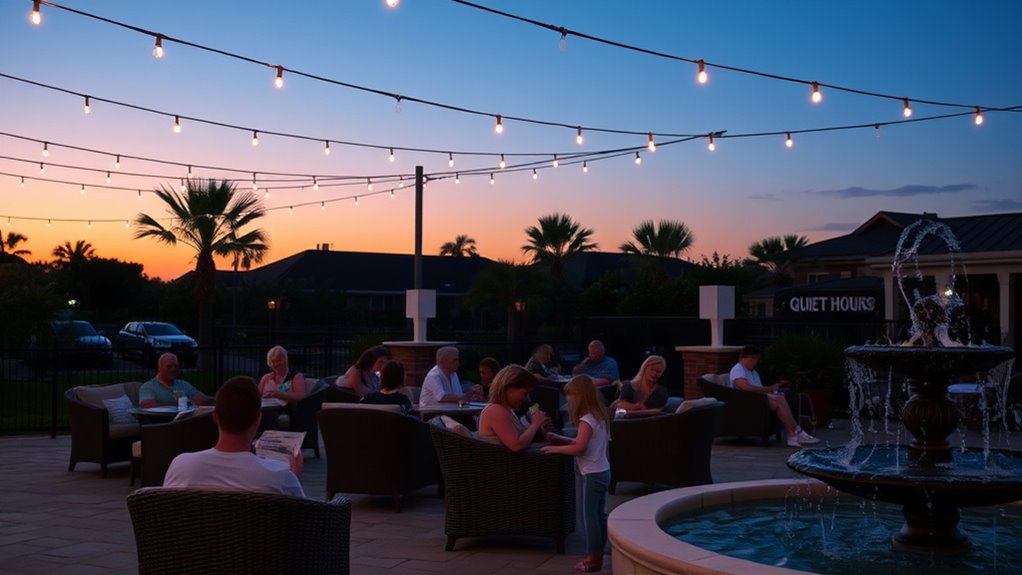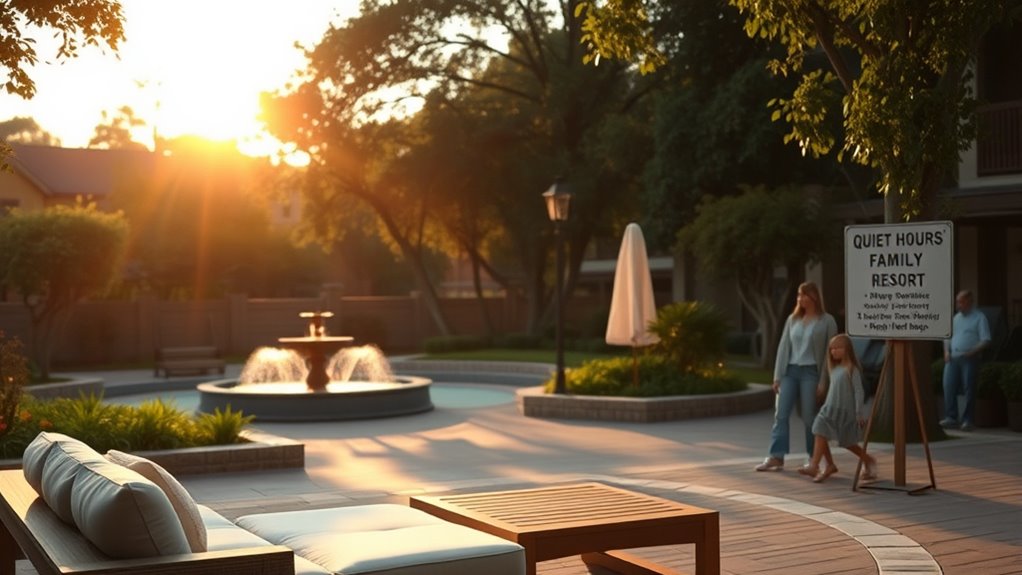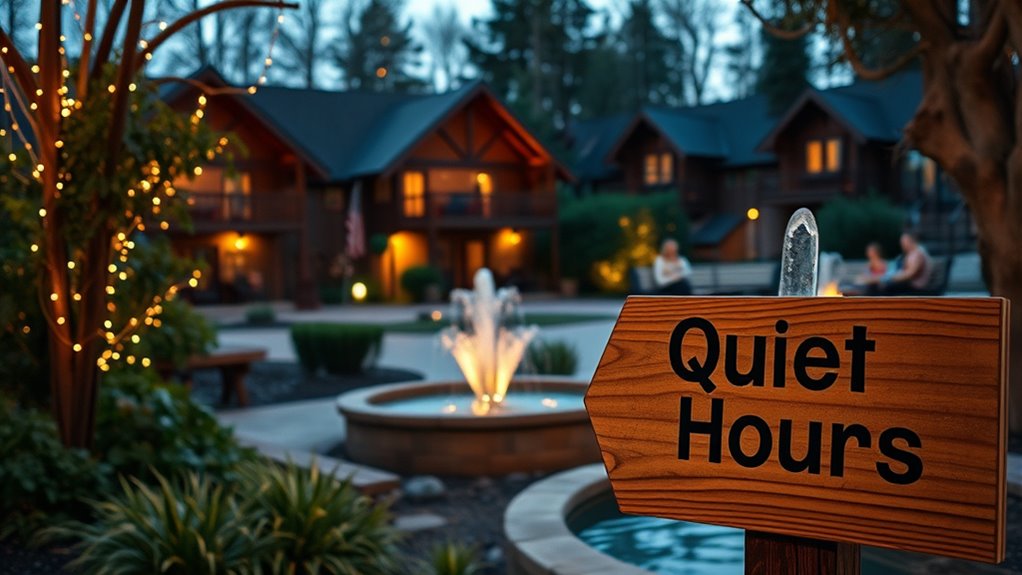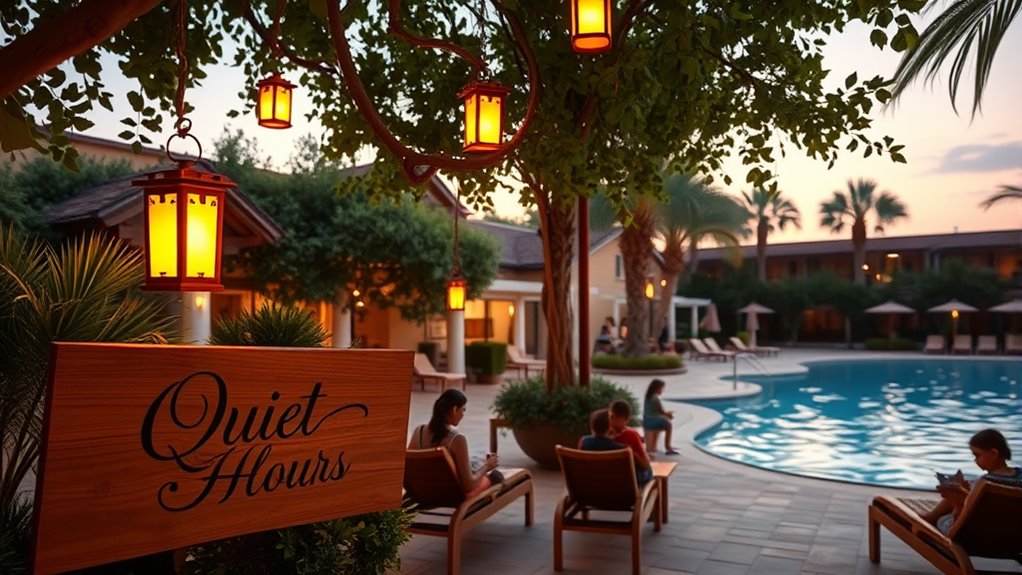At family resorts, quiet hours usually run from around 10 PM to 7 AM, during which noise should stay below 40 dB to guarantee everyone gets restful sleep. You’re encouraged to keep conversations, music, and door slamming low during these times. Staff often monitor noise levels and enforce policies to maintain peace. To learn more about how to enjoy your stay quietly and respectfully, keep exploring the tips and strategies available.
Key Takeaways
- Quiet hours typically run from 10 PM to 7 AM, with policies enforced by staff to ensure guest rest.
- Noise should stay below 40 dB(A) during quiet hours to prevent disturbances.
- Common noise sources include neighboring rooms, hallways, outdoor areas, and evening events.
- Resorts use soundproofing, noise monitoring devices, and strategic planning to minimize noise disruptions.
- Guests are advised to keep noise low, use headphones, and respect others’ space during quiet hours.
Typical Quiet Hours Schedules at Family Resorts

Typically, family resorts set quiet hours from around 10 PM to 7 AM or 9 PM to 7 AM to allow guests to rest peacefully. These hours are usually consistent across many resorts, but some may adjust them based on events or seasonal needs. Resorts often inform you about quiet hours through welcome packets or signs posted around the property. To maintain a peaceful environment, staff or security are usually present to enforce these rules. Some resorts might offer flexibility for special occasions or group bookings, but generally, quiet hours are strictly observed. Factors like the resort’s location, family-friendly activities, and local noise regulations influence the schedule. Overall, these quiet hours aim to create a relaxing atmosphere where everyone can enjoy restful sleep. Additionally, understanding the noise regulations of the area can help ensure compliance and a harmonious stay.
Understanding Guest Noise Expectations During Quiet Hours

Understanding guest noise expectations during quiet hours is essential for creating a peaceful resort environment. Guests value tranquility, especially when they’re trying to sleep or relax. Noise levels above 40 dB(A) can disrupt sleep and negatively impact health, with many reviews citing noise as a major source of dissatisfaction. To meet these expectations, consider these key points:
- Noise should stay below 40 dB(A) during quiet hours to ensure restful sleep.
- Clear communication about noise policies sets proper expectations and builds trust.
- Implementing smart noise sensors helps detect disturbances early, reducing complaints.
- Addressing noise issues promptly boosts guest satisfaction and encourages repeat visits.
– Over 60% of hotel guests report disrupted sleep due to noise, highlighting the importance of maintaining sound levels within recommended limits to enhance guest comfort and prevent negative reviews. Additionally, educating staff on noise management techniques can further improve the overall guest experience.
Common Sources of Noise Complaints and How They Are Managed

Many common sources of noise complaints at family resorts stem from activities and operations within the property, often disrupting guests’ peace during quiet hours. Neighboring guest rooms and hallways are frequent culprits, with noise from conversations, doors closing, or hallway traffic disturbing nearby guests. Children’s play areas, pools, and recreational facilities also generate loud sounds that can carry into guest rooms. Evening events, such as outdoor entertainment or bar gatherings, often produce noise that affects rooms nearby. External noises like traffic, construction, or airport activities can intrude into guest spaces, adding to disturbances. Additionally, housekeeping, maintenance, and staff activities during inconvenient hours sometimes cause complaints. Resorts manage these issues through policies, staff training, and proactive measures to minimize disruptions and maintain a peaceful environment. Incorporating soundproofing techniques and sound management strategies can further help reduce noise transmission and enhance guest comfort.
Strategies and Technologies for Effective Noise Control

Implementing effective noise control at family resorts involves a combination of strategic design and advanced technologies that work together to minimize disruptions. First, soundproofing materials like thick carpets, heavy drapes, and upholstered furniture absorb sound and dampen echoes. Second, smart space planning guarantees noise transfer is minimized between rooms and outdoor areas. Third, regular maintenance of mechanical systems, such as HVAC units and elevators, prevents disruptive noises. Fourth, acoustic window technology considerably reduces external noise, creating a more peaceful environment. These strategies are complemented by innovative noise-monitoring devices like Alertify and NoiseAware sensors, which alert staff to excessive noise levels. Research shows that implementing these measures can reduce noise complaints by up to 60%, and incorporating sound insulation techniques can further enhance guest comfort. These measures help maintain a tranquil atmosphere, ensuring guests enjoy a restful stay.
Tips for Guests to Respect Quiet Hours and Maintain a Peaceful Environment

Respecting quiet hours is essential for creating a peaceful environment that allows all guests to enjoy their stay. To do this, keep noise levels low, especially after 10:00 PM. Avoid loud music, boisterous conversations, or slamming doors. Use headphones if you want to listen to music or watch shows late at night. Remember that quiet hours may include daytime periods, so be mindful during naps or study times. Keep pets under control to prevent disturbances and avoid walking through neighbors’ campsites or private areas. Dimming outdoor lights and lowering voices helps maintain a serene atmosphere. If you’re unsure about quiet hour policies, ask staff. Respect and cooperation ensure everyone has a restful, enjoyable experience at the resort. Proper noise control helps prevent conflicts with neighbors and maintains the campground’s reputation. Being aware of the environmental interactions at the resort can help guests understand the importance of maintaining a tranquil setting.
Frequently Asked Questions
Are Quiet Hours the Same Year-Round or Vary Seasonally?
Quiet hours at family resorts vary seasonally, so you can’t expect them to stay the same year-round. During peak seasons, resorts often extend evening amenities and relax quiet hour rules to accommodate more activities and guests. In contrast, off-peak times typically see stricter enforcement of quiet hours, usually starting earlier. Always check your resort’s specific policies before your stay, as these can shift based on seasonal demands and guest activity levels.
What Specific Penalties Exist for Noise Violations at Family Resorts?
If you violate noise rules at a family resort, you could face warnings, citations, or fines from the resort or local authorities. Repeated violations might lead to eviction or legal action. In some cases, you could be sued for damages or face criminal charges under laws like Penal Code 415. To avoid penalties, follow the resort’s noise policies and respect quiet hours, ensuring a pleasant stay for everyone.
Can Guests Request Room Changes Due to Noise Issues?
Like a bird seeking a quiet branch, you can definitely request a room change if noise becomes an issue. Simply inform the staff, and they’ll do their best to accommodate you, depending on availability. If a room change isn’t possible, they may offer alternatives like noise-canceling headphones. Just remember, early requests improve your chances of finding a peaceful spot, ensuring your stay remains enjoyable and restful.
How Do Resorts Handle Noise Complaints Involving Children?
When kids are noisy, you should notify staff promptly, so they can address the issue calmly and efficiently. Staff typically listen to your concerns, then gently remind families of noise policies or suggest solutions like moving rooms if needed. They handle complaints with empathy, aiming to balance family needs and guest comfort. Quick responses help prevent frustration, improve your experience, and maintain the resort’s peaceful atmosphere.
Are Outdoor Areas Subject to Different Noise Policies Than Indoor Spaces?
Outdoor areas often have looser limits and less strict restrictions than indoor spaces. You’ll find that outdoor noise policies depend on local laws, allowing louder gatherings or amplified activities until specified hours, like 9 PM. Meanwhile, indoor spaces impose more stringent silence standards, supported by soundproofing and staff supervision. Consequently, outdoor zones promote more boisterous, bustling behavior, while indoor areas prioritize peace, quiet, and privacy, creating contrasting, controlled conditions.
Conclusion
By embracing quiet hours and respecting noise expectations, you naturally contribute to a peaceful atmosphere that everyone can enjoy. It’s a coincidence how a little mindfulness can turn a busy resort into a tranquil retreat, making your stay more relaxing. When you’re considerate of others, you help create shared moments of calm that everyone will appreciate. So, enjoy your time, follow the rules, and discover how peaceful your getaway can truly be.









